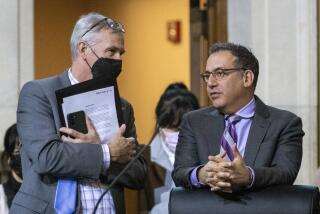Departments Rebel Against Budget Cuts
Every autumn, Los Angeles Mayor Richard Riordan sends out letters to city departments, telling them how much their budgets should be cut and how much more efficient they are expected to become.
The departments grumble but comply.
Not this year.
To the surprise and irritation of mayoral aides, most city departments fell short of the goals Riordan set, and their resistance has challenged a short-staffed Riordan budget team as it tries to wrestle control of the city’s finances.
Where the mayor’s office asked all departments to find savings of between 2% and 6%, depending on the agency, virtually every one of them came back asking for more money than last year, officials said.
At a minimum, the unforeseen reactions by some departments could prolong and complicate the annual budget process. Even more serious, they threaten to thwart Riordan’s desire to squeeze greater productivity out of the city’s work force--which would undermine efforts to expand city services into new areas.
That effort is crucial to the mayor’s approach for improving city services because even though the local economy has rebounded in recent years, it takes time for economic growth to translate into increased tax revenues.
*
The departments do not appear to be in a mood to wait. “They’ve identified a lot of needs,” said Keith Comrie, the city administrative officer, who sat in on last week’s budget sessions. “It was a little surprising to me to hear such unanimity among all 36 departments.”
Among the departments that have stirred controversy:
* The Los Angeles Police Department was told to cut 6% of its billion-dollar budget; instead, top officials came back with proposals to add millions of dollars to the LAPD’s bottom line and to continue expanding the size of the department, although at a far more modest rate than in recent years. Overall, the LAPD proposes to grow 18%.
* The city attorney’s office was scheduled for cuts of 2%, which it found in its current operations. But then the office, which has clashed openly with the Riordan administration on a number of issues, turned around and asked for an array of new programs and staff. The bottom line: a requested increase of more than 10%.
* The Recreation and Parks Department was directed to trim 4%. It moved in the opposite direction, requesting permission to hire 30 additional gardeners. Its explanation: The City Council’s recent ban on leaf blowers will make it harder to keep city parks leaf-free without more people wielding rakes.
In meetings all week, department heads and budget experts laid out their proposals for the coming fiscal year, which starts July 1. The participants in those meetings describe them as productive and cordial, but officials on both sides say that the mayor’s office and the departments it supervises remain far apart in a number of key areas.
According to Riordan administration officials and others involved in the budget process, some departments, such as Building and Safety, did identify ways to improve their operations.
Other departments returned with little or nothing to say on that topic.
Deputy Mayor Kelly Martin, who is supervising the process for the mayor, conceded in an interview that the initial round of budget meetings has at times been frustrating, but she emphasized that it is early in the process and that mayoral aides will work closely with all departments.
Asked to evaluate the response of city departments to their budget directives, she responded: “It’s not as good as I would have hoped. . . . Some were great. Some were terrible.”
Robin Kramer, Riordan’s chief of staff, attributed some of the first-round budget requests to gamesmanship. “This is a dance,” she said. “There’s a lot of theater to it.”
Like other officials, Kramer acknowledged that the budget requests often were higher than Riordan anticipated. But “there is a long road ahead,” she said.
*
After the initial round of meetings this week, mayoral aides and members of the city administrative office staff will sift through the requests and begin narrowing down the discussion. Department heads are expected to have face-to-face meetings with Riordan early next year, after which the mayor’s office will finalize its budget and send it to the City Council for consideration.
Although neither Kramer nor Martin would provide specific budget number requests, various officials said the LAPD was a source of particular concern.
From the outset, police officials balked at the notion of trimming 6%. After learning of the request, Bill Moran, the LAPD’s director of fiscal and support operations, warned that in recent years the department has aggressively trimmed desk jobs to put more officers in the field. That, he said, has left little room for more paring.
Indeed, the LAPD came back with a request that sought increases in a variety of areas. In part, that reflected the addition of transit officers as part of the merger with the Metropolitan Transportation Authority police. The department’s proposed budget would add about 40 officers to patrol functions and seeks money for new initiatives.
In a report to the Police Commission, LAPD officials said they had attempted to identify “productivity improvements,” but could not say how much money would be saved. Among other things, the report cites the recent LAPD reorganization and a proposal to reduce police response to alarm calls.
“They didn’t show up with a 6% [cut],” Martin said. “They showed up with a request for additional money.”
According to Martin, she responded to LAPD officials by telling them: “I’d love to give you everything you’ve asked for, but we just don’t have the money.”
Comrie, a City Hall veteran with long experience in budget talks, agreed that the departments this year have been remarkably consistent in asking for more money despite the Riordan administration’s orders to find new savings.
But Comrie also said he was not surprised to hear departments clamoring for more resources. Most city departments, he noted, have been cutting back for years, beginning in 1991, when the recession began to be felt, and continuing through Riordan’s first term.
Now, with the economy starting to rebound, Comrie said, it was natural that city agencies would hope to begin expanding their services. Nevertheless, Comrie added, he was struck by how many departments seem to be feeling the pinch.
“Almost every one of them thought they really needed to improve and expand service,” he said.
Councilman Richard Alatorre, who heads the Budget and Finance Committee, said a number of departments have complained about the cuts they are being asked to absorb. In the past, department heads have often tried to circumvent proposed cuts by the mayor by reaching out to council members and asking them to restore money.
*
Alatorre expressed sympathy for some of the agencies, but warned that they will find it tough going in the council. Unless the state government can be convinced to return some money to the city--which is unlikely in the short run, officials agree--Alatorre said many Los Angeles agencies will be forced to continue skimping.
“There’s a lot of departments that are nervous,” he said. “But what else can we do? . . . People have to understand. All we can do is pass out what we have.”
As it wades into the heart of the budget season, the mayor’s team has been forced to grapple with a conspicuous absence: Budget Director Chris O’Donnell resigned last month, leaving a key job in the administration vacant. O’Donnell was a respected member of the mayor’s team who was fluent in the intricacies of city spending, but Riordan aides insist that his departure has not severely handicapped the budget talks.
O’Donnell’s two assistants have handled many of the financial details and continue to participate in the negotiations.
Riordan officials have moved quickly to plug the hole left by O’Donnell’s resignation. On Friday, they announced the hiring of Jennifer P. Roth, who handles financial issues for the Los Angeles County Department of Children and Family Services.
More to Read
Sign up for Essential California
The most important California stories and recommendations in your inbox every morning.
You may occasionally receive promotional content from the Los Angeles Times.










